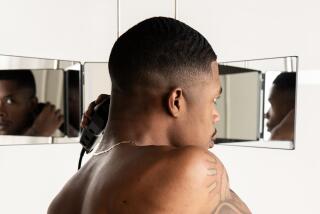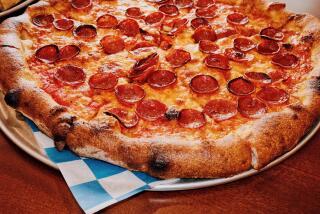In the Buzz Biz
Some day soon, the last barber will lock up the last barbershop, hand the keys to Fantastic Sam, donate his barber pole to the Smithsonian and ride off into the sunset of nostalgia, joining the town crier and the doctor who makes house calls, right?
Wrong. Not when Shaq leads the Lakers to victory with nary a hair on his head, Tom Cruise debuts a new buzz cut at the Oscars, and long-locked John Corbett is the one stealing Carrieâs heart with his newly shorn look on âSex and the City.â
Todayâs trend toward short or no hair means more men are making more trips to the barber for their grooming needs. âWeâve enjoyed a renaissance since the â90s,â said James Knauss, executive director of the U.S. Barbers Assn. âPeople are rediscovering short haircuts like the âfadeâ, which is what we used to call the âhigh and tight.ââ
âItâs the 1940s-style classic cut thatâs our bread and butter,â says Woody Lovell, talking about the Barber Shop Club he owns on trendy Melrose Avenue, where spiky Mohawks would seem to be the stock in trade. âThe tight taper around the neck and ears, the businessmenâs cut.â
While barbers are busier than ever, the short-hair trend may not single-handedly reverse the decline in the number of barbershops precipitated by the 1964 arrival of the mop-topped Beatles and the long-haired 1970s. Despite full-capacity enrollment at most of Californiaâs barber colleges, there are now about 1,500 fewer licensed barbers in the state than there were in 1992.
But these days a barbershop is as much about a lifestyle choice and a sense of belonging--a place where men can really let their hair down. And once a man discovers that his local barber can offer everything from a shave to a shoeshine to a recap of last nightâs game, heâs more than likely to stay a client for a long time.
âItâs not unusual to cut four or five generations of men,â said Knauss. âWhen it comes to hair, men are loyal.â
Whether itâs the air-hockey table, snack bar and VIP room at the New Millennium Sports Barbershop on Crenshaw; the art exhibits, fight nights or cigar club at the Barber Shop Club on Melrose; or the massages, tonics and shaves at the Larchmont Barbershop, the shops are a sanctuary, a tradition thatâs an homage to men everywhere. And itâs by occupying this unique place in the lives of men that L.A. Countyâs 5,096 licensed barbers stay in business.
When asked what sets his Larchmont Barbershop apart from the Supercuts a few doors down and similar hair-cutting chains, Jerry Cottone looked up from the chin he was shaving and held his straight razor proudly in the air. âWe can use this, they canât. And we canât do permanent waving.â
But the straight-razor shave and the permanent wave arenât all that separate barbers from cosmetologists, according to the California Department of Consumer Affairs, which regulates barbering. Another difference is the pole. âA business cannot call itself a barbershop unless at least one barber is employed, and a shop cannot display a barber pole unless at least one licensed barber is employed,â said consumer affairs spokesman Rick Lopes.
Why pay 18 bucks to have a stranger do something most men do for themselves every morning? âItâs a luxury thing,â said Cottone. (Or the male equivalent to getting a manicure at a nail salon.) As if to prove his point, Cottone tipped a customer back to the point of being almost horizontal and began the ritual, priming the face with hot towels. He then spread on a thick, Noxema-scented cream, and applied a warm lather before brandishing the blade. After the first cut was finished, Cottone started all over again, this time shaving at a different angle.
âIâll do two in one day and then go weeks without one,â Cottone said. But the barbershop is a popular stop for young grooms on the way to the altar, he said. âThey come in with their fathers on the morning of their weddings for the moment of male bonding that comes with a professional shave.â
And that sort of barbershop moment isnât necessarily the goal at a Supercuts, according to company spokesman Jenny LaPoint. The 1,500-outlet chain, she points out, was founded in 1975 with the goal of offering haircuts without having to make an appointment. But a quick clip isnât all some men want from their barbering experience.
âA barbershop is a place for gossip, conversation and relaxing,â said Jay Cobb of the New Millennium on Crenshaw Boulevard. Cobb, a 24-year-old L.A. resident and six-year barber, is clad in below-the-knee shorts and a blue T-shirt. The only clue to his profession is the miniature gold barberâs pole, half the size of a pinkie finger, which hangs on a gold chain around his neck. âOn this block there are about three places to get your hair cut,â he said. âBut coming here makes you feel good.â
A Change in Ambience
on Trendy Melrose
The New Millennium feels more like a sports bar than a place to get a haircut. Customers can lounge on purple and gold benches and watch a game on the big screen TV. Pool tables and a few video games fill the center of the room, while barber chairs flank the sides. A signed J.R. Rider jersey adorns the wall near the Laker-colored purple-and-gold price list: adult cuts start at $15; afros cost $20. Owner Anthony Allen paces the floor in a black-and-white refereeâs shirt.
One of Cobbâs customers, a 37-year-old pipe-fitter from the neighborhood who goes by D. Jay, said that his clean pate requires twice-weekly visits. âSure, you want a good haircut, but you want a place where you can relax at the same time. This place is peaceful.â
One of the New Millenniumâs most popular cuts is the fade (hair on the sides of the head âfadesâ in length), which can bring customers in as often as once a week. âWe get a lot of repeat business because people feel safe here,â Allen said, âWe donât allow any hanging out. The pool tables are for people waiting for cuts.â
At Cottoneâs Larchmont shop, waiting customers can flip through the daily newspaper or watch a boxy Zenith Chromacolor II. Family pictures, newspaper clippings and barber-themed cartoons cover the few parts of the wall that arenât mirrored.
The 62-year-old Cottone has been clipping and shaving for four decades. The North Hollywood resident wears the traditional white barberâs smock and cuts hair for $18 a head. His handiwork has included the late H.R. Haldemanâs signature flattop, but most of the clips he gives nowadays are of the classic, short on the sides and back, no-nonsense variety.
On a recent afternoon, the screen door creaked open and an older gentleman stuck his head into the shop. âHey, I heard Bob died,â he said. Nodding an affirmation, Cottone continued his cut. The man stepped inside just long enough for Cottone to recount the passing of long-time Larchmont merchant Bob Landis. When he finished, he pointed to a folded newspaper. âItâs in the paper,â Cottone said. But the visitor didnât need it or a haircut. He had just received barbershop services that canât be found on any price list.
âSupercuts canât do what he does,â said Mike Aronoff, 30, of West Hills, who, with his dad, has been making the pilgrimage to the Larchmont Barbershop every three weeks since he was 9 years old.
The Barber Shop Club on Melrose straddles the old-school feel of the Larchmont Barbershop and the high-energy vibe of the New Millennium. Between clients, Lovell, 32, takes a chair out on to Melrose and sits under a huge canvas umbrella. His brightly patterned Hawaiian shirt and long shorts make him look as if heâs on vacation. âWe wanted to stick with what works but give it a modern feel,â he said of his shop.
âModernâ isnât the first word that comes to mind to describe the 1940s-style shop. A line of Koken barber chairs stand at attention, dark wood frames the mirrors and walls, and a ceiling fan whirls lazily. Strains of the blues warble from the back of the shop.
Then one sees the laptop computer and the price list with haircuts starting at $40 and a CD player--not a live body--thatâs crooning the blues. This is what happens when the barbering trade meets the 21st century: a traditional-looking shop that boasts an open-mike night, a line of vintage-style Hawaiian shirts and a Web site (https://www.barbershopclub.com).
And, in a nod to the role the barbershop has played in menâs lives through the years, Lovell offers the ultimate service--belonging. For $175 a year, one can even become a member of the Barber Shop Club. âYou get discounts when you buy stuff,â explained, âAnd you get invited to things like our private poker parties.â



